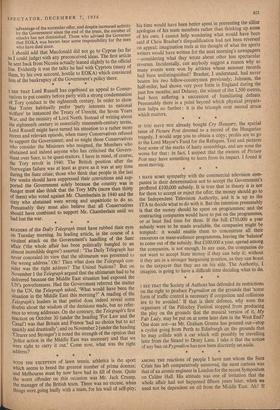I SEE THAT Lord Russell has combined an appeal to
Conser- vatives to put country before party with a strong condemnation of Tory conduct in the eighteenth century. In order to show that Tories habitually prefer 'party interests to national welfare' he instanced the Treaty of Utrecht, the Seven Years War, and the ministry of Lord North. Instead of writing about the eighteenth century in essentially nineteenth-century terms, Lord Russell might have turned his attention to a rather more recent and relevant episode, when many Conservatives refused to support the Government; and so might those Conservatives Who consider the Ministers who resigned, the Members who abstained and indeed anyone who has criticised the Govern- ment over Suez, to be quasi-traitors. I have in mind, of course, the Tory revolt in 1940. The British position after the Norwegian failure was at least as grave as it was at any time during the Suez crisis; those who think that people in the last few weeks should have suppressed their convictions and sup- ported the Government solely because the country was in danger must also think that the Tory MPs (more than thirty of them) who voted against Mr. Chamberlain in 1940 and the sixty who abstained were wrong and unpatriotic to do so. Presumably they must also believe that all Conservatives should have combined to support Mr. Chamberlain until we had lost the war.
* * *


































 Previous page
Previous page